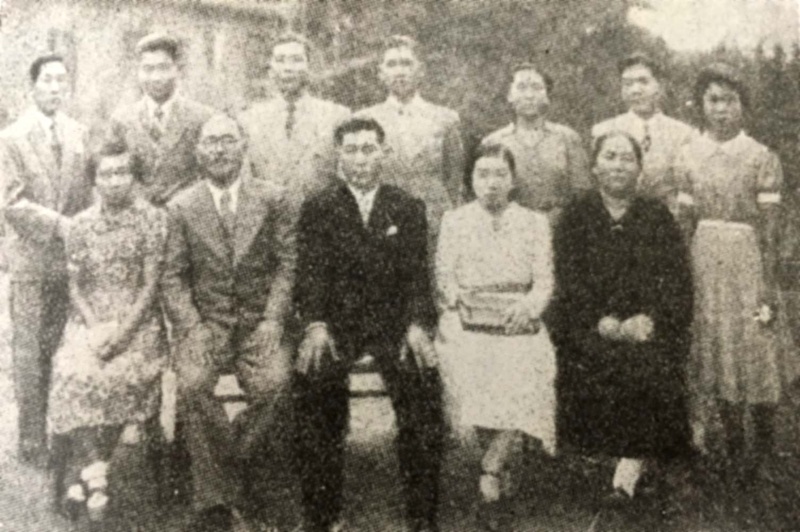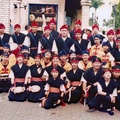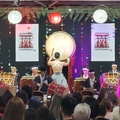It was in the city of Registro, in the Vale do Ribeira region, in São Paulo, where my family on my father's side settled. As do many Japanese immigrants.
Originally from there and a fan of rice and beans, my great-uncle, Issuo Maebuti, 94 years old, tells the family story in his cheerful and good-humored way.
Trajectory of Katsuji and Toki, precursors in Brazil
My great-grandfather, Katsuji, came from Japan with my great-grandmother, Toki. They disembarked in Santos and went to Jaboticabal, near Ribeirão Preto, São Paulo. Uncle João, as he was always called by the family, says that they stayed there for about six years working on a coffee farm, owned by Spaniards.
“There was no way to escape. In my father's time, no one ran away. It was good, because I got pork. I don’t know if per day or per month”, he reveals.
According to Japanese immigration rules in Brazil, it was necessary to arrive married and with children. They brought a 17-year-old boy. When they moved to Registro, the owner of the farm said: “'Can't Mr. Maebuti leave the boy alone for another month? I need it'”. The boy stayed, but ended up a victim of yellow fever.
Later, a Japanese colony emerged in Registro. “Business from a hundred years ago is different from today. When my father entered the coast, in Registro, on the farm, he suffered like hell. Ever wonder? I kill everything, there is nothing, we have to take it down. It's not easy to knock down a log like that. You need to build five meter scaffolding, cut it down and tear it down. And it was about 40 meters long”, he says about the difficulties. “My mother said how much a lizard appeared, it looked like an alligator. And paca, capybara, otter, jacu...”
Planted crops
The Maebuchi family grew everything. “Banana, avocado, pineapple, rice, beans, vegetables, roots, watermelon, coffee, gobo [ burdock ], daikon [ turnip ]. In our spare time, we planted. There were no Sundays there, there were no holidays…” The uncle says that after returning from school he helped his parents with mowing.
Regarding coffee, my great-grandfather Katsuji took the Jaboticabal seed to plant in Registro. It worked and even the company Kaigai Kogyo Kabushiki Kaisha – KKKK concluded, after a visit to the site, that the region was good for coffee. So much so that their neighbor started to dedicate himself to coffee culture too.
“I sold, drank, roasted coffee, when I had a roasting machine. He sold everything, beans, rice, coconuts (harvested, dried and peeled). Rice was sold already processed. Then I bought sugar, salt, clothes”, he explains.
In addition, they cultivated mulberries and even raised silkworms. “It was cold, we put it on our noses.” (laughter)
Family
My great-grandparents had ten children: Nobuko, Kasutomo, Wataru, Takeyoshi (my grandfather, better known as Gaspar), Michino, Issuo (the only one alive of the brothers, “last of the Mohicans”), Yoshihaku, Setsuharu, Aunt Maria and Aunt Kazumi.
Everything indicates that the relationship between them was good, because there were no fights. “My older brother worked on the farm. The second oldest worked in the city, processing rice. He was the boss, because he was the one who worked the machine. And Gaspar worked in the tailor shop. Each one had their own service”, he explains.
Only the two of the family came. If a cousin or other relative came, my great-grandfather would be notified. “But no one came.”
“When he got old, he didn't want anything to do with Japan. He didn't say anything, because he was more worried about working. Because at that time it was not easy to survive. I planted rice, it didn't work; I planted beans, it didn't work. It couldn’t be done, because it would cut down and burn virgin forest.” Maybe that's why my great-grandfather Katsuji never showed longing for his homeland.
Brother to brother office
When my grandfather, at age 20, opened a tailoring shop, my uncle came to help. “I worked as a partner for ten years [from 1939 to 1949] . I learned from him.” I was 14 years old at the time. “I even remember the first customer who went in there, a friend of his, a caboclo from the bush. 'Hey, Takeyoshi! You have a tailor's shop, you're going to make me some pants,'” he recalls.
Changing city and life
Uncle João lived in Registro until he was 20 years old, around 1949. Afterwards, my grandfather got married and his uncle came with his parents to São Paulo to take care of them.
“Here I worked as a tailor until I was 65 years old. I worked for six years as an employee at Alfaiataria Moreira to get to know what it’s like to be a tailor in the capital.”
Issuo didn't know São Paulo. But his brother, Yoshihaku, did. They bought a popular newspaper that published job advertisements, among which they found one for a collar worker, who works as a collar worker. “Go and see what the business is like”, he asked his brother.
“When he went, it was still early. He stayed there in the corridor, coming and going, the tailor shop is open. The man looked on, then said:
'Do you need anything?'.
'No, I'm waiting for the factory to open'.
'Do what?'
'My brother is a tailor, he doesn't want to work as a tailor anymore, he says there are people who make collars, right? So I'm waiting'.
'Ah, it's nonsense, tell your brother to work here'”.
In the production of 300 shirts per month, 300 collars would add up to 300 cruises. “With 300 cruises you can’t do anything. It’s not possible to live,” he explains.
At night, the decisive moment in the uncle's life arrived when he found out about the job offer. “My mother said: 'Ah, until you get used to it in São Paulo, see if it stays there in the tailor shop'. I also thought: it's good, right? You can go look for another service.” And he decided to stay. “Then I opened a tailoring shop. It was tough, it was tough”, he confesses.
Memories of other times
The only childhood memory that the uncle remembers is when he was around 3 or 4 years old. “I took that red banana thing. Underneath the curl is the heart, cut it. I used to make a wheel to push a cart.”
During his studies, he attended the community school for four years, which he did not find difficult. “I only spoke Japanese, I couldn’t speak Portuguese. He spoke Portuguese with his colleague and his brothers.” A peculiarity is that the teacher was an immigrant or descendant who volunteered for this role. “As there was a lack of teachers at the school, they added my sister. Mi-chan is a friend of hers. I didn’t even know how to teach, but I was there”, he says.
Despite the difficulties, the journey to school was fun. “Barefoot, there were days when it was cold, but I didn’t have a coat, just a short-sleeved shirt. To cross the bridge, it was freezing. On earth, there is none, but on the board there is. [laughter] And, to step foot in the frost, it was cold, freezing. It was about 4 km [to the school] . But we didn’t think anything.”
Today, he is one of the founders (with a diploma) of the city's club, RBBC [ Registro Base Ball Club ], where he trained baseball at the age of 17, 18. “I was in baseball. There was no uniform, because I was from [ team ] C. A, B had a uniform, C didn't. C graduated on his own. My brother was the one who made [ the uniforms ]. A lot. There was no other tailor who did it, no.”
Portuguese or Japanese
From what Uncle João says, my paternal great-grandparents didn't know how to speak Portuguese and didn't understand anything in the language. Therefore, when they shopped at the store inside the farm, they had to mime. “To buy eggs, I had to fly,” he says and laughs.
Furthermore, he only spoke Japanese with his parents. “When I spoke Portuguese, my mother thought it was bad. 'You're speaking Portuguese again!'” And he continues: “My father only knew what was written on the truck or the house: 'for sale'. I said it wrong: 'it says vendensse '. ' No, don't sell it , it's 'sell it'. My mother didn't know how to say anything. She only spoke the color red. [laughs] 'Vermeio', 'bermeio'”.
To this day, he says he still remembers the Japanese language well. But he comments that he has no one to talk to – his wife, Aunt Adi, only speaks Portuguese. On television, he watches Japanese channels.
Just a longing
“I miss walking around Registro. Our hometown, right? We were born, raised and grew up as adults there. And he still has,” confesses Uncle João.
© 2019 Tatiana Maebuchi






